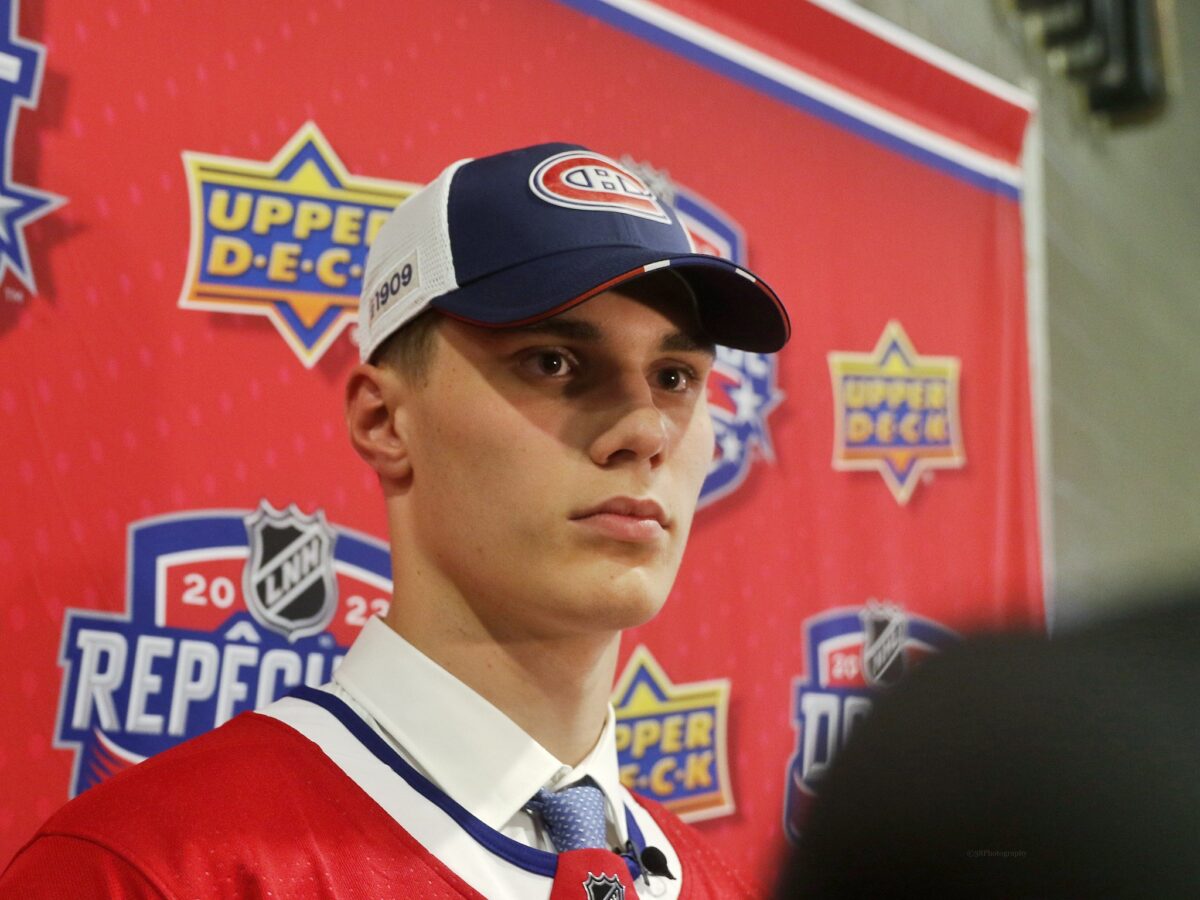Juraj Slafkovsky had the opportunity to play in the 2022 World Junior Championships (WJC) in August. However, he chose to skip the tournament to prepare for his first professional training camp with the Montreal Canadiens. Now, with the 2023 tournament being held in Moncton and Halifax, there will again be a choice to play internationally or focus on the NHL.
Could playing allow management an opportunity to assess how his game has improved in comparison to his peers by allowing him to compete against them in a short tournament, or would his development be better served by remaining in the NHL and polishing his game under the eye of head coach Martin St. Louis?
World Junior Championships’ Worth
Other NHL clubs have sent some of their top prospects. His “competition” for the top pick at the 2022 NHL Draft, Shane Wright, has been loaned to Team Canada for the tournament. Joining him are several other top prospects from the 2022 class and the top players from the very deep 2023 class. This means that the 2023 WJC will be highly competitive and entertaining, possibly making it a good developmental tool.
Related: Opportunity Knocks for Slafkovsky as Injuries Mount
What is the value of Slafkovsky going to the WJC? One thing would be that he would be the main difference maker for his Slovakian national team. A national team that isn’t expected to compete for a medal without him. With him, they would be a dark horse for a bronze medal at best. It would provide general manager (GM) Kent Hughes an opportunity to assess his progress by playing against his peers. However, it would open him up to the possibility of an injury. One recent example is a significant wrist injury that caused Kirby Dach to miss nearly an entire season with the Chicago Blackhawks. That would be a devastating blow to his development, yet players risk injury no matter where they play.
Slafkovsky has shown himself capable of growth during international play. His performance at the Olympics, winning a bronze medal and earning tournament MVP honors, became a springboard for the then 17-year-old winger who, upon his return to his Finnish professional team, played with far more confidence and became a more dangerous player. If he were to join Slovakia at the WJC it could provide the Canadiens a roster spot to allow other prospects, such as Jesse Ylonen, an NHL opportunity to assess their development.
Canadiens Best Choice
The question is, will sending Slafkovsky truly aid in his development? Looking at his main issues in his NHL game, the problems that leap out are his need to adjust to playing against the world’s best players, as well as learning to read opposing systems. Layered onto that is his need to adjust to the speed of play at the NHL. That isn’t foot speed, which he has plenty of, but the speed to read and react to plays — essentially, becoming comfortable with the pace of play in the NHL.

Over his first 21 games, he has averaged 11:29 playing mostly on the fourth line with some power-play time. Slafkovsky has posted four goals and eight points, putting him on pace for 18 goals over 82 games, similar to what another rookie power forward, Andrei Svechnikov, scored in his rookie season with the Carolina Hurricanes.
A major factor to consider is the recent laundry list of injuries at forward for the Canadiens. They have lost Jonathan Drouin, Mike Hoffman, Brendan Gallagher, and now Sean Monahan. This has opened up more opportunities for Slafkovsky, who has been moved up to the top six and has been given more time on the power play. Also, it has meant more time on ice, moving up from 10 minutes per game to nearly 15 minutes. This has meant he has played with better players — no offense to the Habs’ fourth line — but the rookie’s skill set matches much better with higher-skilled players. Also, he would be available to be given far more attention by the Canadiens’ developmental staff as well.
At this point, the only reason to allow him to go would be if he desired to do so. With Slafkovsky now playing more minutes he has far more opportunity to adjust to the NHL game. Also, he is being placed in more prominent roles in the top six and on the power play. This means he is being paired with more skillful players than he would have the opportunity to play with in Moncton and Halifax. Sending him there would also risk interrupting his steady development that he has worked hard to build up. If he was still a fourth-line player with no time on special teams, there could be value in going to the WJC. However, with him now moving up the lineup and getting more playing time, his development is better served to remain in Montreal.
